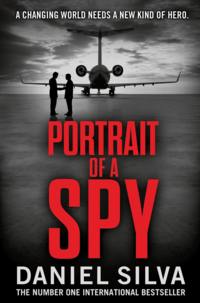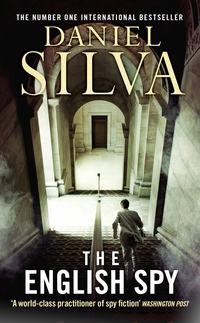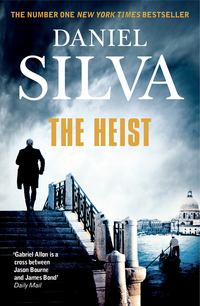
Полная версия
The English Girl
Among those fortunate enough to survive the bombing was a young British intelligence officer named Arthur Seymour, a veteran of the wartime Double Cross program who had recently been transferred to Palestine to spy on the Jewish underground. Seymour should have been in his office at the time of the attack but was running a few minutes late after meeting with an informant in the Old City. He heard the detonation as he was passing through the Jaffa Gate and watched in horror as part of the hotel collapsed. The image would haunt Seymour for the remainder of his life and shape the course of his career. Virulently anti-Israeli and fluent in Arabic, he developed uncomfortably close ties to many of Israel’s enemies. He was a regular guest of Egyptian president Gamal Abdel Nasser and an early admirer of a young Palestinian revolutionary named Yasir Arafat.
Despite his pro-Arab sympathies, the Office regarded Arthur Seymour as one of MI6’s most capable officers in the Middle East. And so it came as something of a surprise when Seymour’s only son, Graham, chose a career at MI5 rather than the more glamorous Secret Intelligence Service. Seymour the Younger, as he was known early in his career, served first in counterintelligence, working against the KGB in London. Then, after the fall of the Berlin Wall and the rise in Islamic fanaticism, he was promoted to chief of counterterrorism. Now, as MI5’s deputy director, he had been forced to rely on his expertise in both disciplines. There were more Russian spies plying their trade in London these days than at the height of the Cold War. And thanks to mistakes by successive British governments, the United Kingdom was now home to several thousand Islamic militants from the Arab world and Asia. Seymour referred to London as “Kandahar on the Thames.” Privately, he worried that his country was sliding closer to the edge of a civilizational abyss.
Though Graham Seymour had inherited his father’s passion for pure espionage, he shared none of his disdain for the State of Israel. Indeed, under his guidance, MI5 had forged close ties with the Office and, in particular, with Gabriel Allon. The two men regarded themselves as members of a secret brotherhood who did the unpleasant chores no one else was willing to do and worried about the consequences later. They had fought for one another, bled for one another, and in some cases killed for one another. They were as close as two spies from opposing services could be, which meant they distrusted each other only a little.
“Is there anyone in this hotel who doesn’t know who you are?” Seymour asked, shaking Gabriel’s outstretched hand as though it belonged to someone he was meeting for the first time.
“The girl at reception asked if I was here for the Greenberg bar mitzvah.”
Seymour gave a discreet smile. With his pewter-colored locks and sturdy jaw, he looked the archetype of the British colonial baron, a man who decided important matters and never poured his own tea.
“Inside or out?” asked Gabriel.
“Out,” said Seymour.
They sat down at a table outside on the terrace, Gabriel facing the hotel, Seymour the walls of the Old City. It was a few minutes after eleven, the lull between breakfast and lunch. Gabriel drank only coffee but Seymour ordered lavishly. His wife was an enthusiastic but dreadful cook. For Seymour, airline food was a treat, and a hotel brunch, even from the kitchen of the King David, was an occasion to be savored. So, too, it seemed, was the view of the Old City.
“You might find this hard to believe,” he said between bites of his omelet, “but this is the first time I’ve ever set foot in your country.”
“I know,” Gabriel replied. “It’s all in your file.”
“Interesting reading?”
“I’m sure it’s nothing compared to what your service has on me.”
“How could it be? I am but a humble servant of Her Majesty’s Security Service. You, on the other hand, are a legend. After all,” Seymour added, lowering his voice, “how many intelligence officers can say they spared the world an apocalypse?”
Gabriel glanced over his shoulder and stared at the golden Dome of the Rock, Islam’s third-holiest shrine, sparkling in the crystalline Jerusalem sunlight. Five months earlier, in a secret chamber 167 feet beneath the surface of the Temple Mount, he had discovered a massive bomb that, had it detonated, would have brought down the entire plateau. He had also discovered twenty-two pillars from Solomon’s Temple of Jerusalem, thus proving beyond doubt that the ancient Jewish sanctuary, described in Kings and Chronicles, had in fact existed. Though Gabriel’s name never appeared in the press coverage of the momentous discovery, his involvement in the affair was well known in certain circles of the Western intelligence community. It was also known that his closest friend, the noted biblical archaeologist and Office operative Eli Lavon, had nearly died trying to save the pillars from destruction.
“You’re damn lucky that bomb didn’t go off,” Seymour said. “If it had, several million Muslims would have been on your borders in a matter of hours. After that …” Seymour’s voice trailed off.
“It would have been lights out on the enterprise known as the State of Israel,” Gabriel said, finishing Seymour’s thought for him. “Which is exactly what the Iranians and their friends in Hezbollah wanted to happen.”
“I can’t imagine what it must have been like when you saw those pillars for the first time.”
“To be honest, Graham, I didn’t have time to enjoy the moment. I was too busy trying to keep Eli alive.”
“How is he?”
“He spent two months in the hospital, but he looks almost as good as new. He’s actually back at work.”
“For the Office?”
Gabriel shook his head. “He’s digging in the Western Wall Tunnel again. I can arrange a private tour if you like. In fact, if you’re interested, I can show you the secret passage that leads directly into the Temple Mount.”
“I’m not sure my government would approve.” Seymour lapsed into silence while a waiter refilled their coffee cups. Then, when they were alone again, he said, “So the rumor is true after all.”
“Which rumor is that?”
“The one about the prodigal son finally returning home. It’s funny,” he added, smiling sadly, “but I always assumed you’d spend the rest of your life walking the cliffs of Cornwall.”
“It’s beautiful there, Graham. But England is your home, not mine.”
“Sometimes even I don’t feel at home there any longer,” Seymour said. “Helen and I recently purchased a villa in Portugal. Soon I’ll be an exile, like you used to be.”
“How soon?” asked Gabriel.
“Nothing’s imminent,” Seymour answered. “But eventually all good things must end.”
“You’ve had a great career, Graham.”
“Have I? It’s difficult to measure success in the security business, isn’t it? We’re judged on things that don’t happen—the secrets that aren’t stolen, the buildings that don’t explode. It can be a profoundly unsatisfying way of earning a living.”
“What are you going to do in Portugal?”
“Helen will attempt to poison me with her exotic cooking, and I will paint dreadful watercolor landscapes.”
“I never knew you painted.”
“For good reason.” Seymour frowned at the view as though it was far beyond the reach of his brush and palette. “My father would be spinning in his grave if he knew I was here.”
“So why are you here?”
“I was wondering whether you might be willing to find something for a friend of mine.”
“Does the friend have a name?”
Seymour made no reply. Instead, he opened his attaché case and withdrew an eight-by-ten photograph, which he handed to Gabriel. It showed an attractive young woman staring directly into the camera, holding a three-day-old copy of the International Herald Tribune.
“Madeline Hart?” asked Gabriel.
Seymour nodded. Then he handed Gabriel a sheet of A4 paper. On it was a single sentence composed in a plain sans serif typeface:
You have seven days, or the girl dies.
“Shit,” said Gabriel softly.
“I’m afraid it gets better.”

Coincidentally, the management of the King David had placed Graham Seymour, the only son of Arthur Seymour, in the same wing of the hotel that had been destroyed in 1946. In fact, Seymour’s room was just down the hall from the one his father had used as an office during the waning days of the British Mandate in Palestine. Arriving, they found the DO NOT DISTURB sign still hanging from the latch, along with a sack containing the Jerusalem Post and Haaretz. Seymour led Gabriel inside. Then, satisfied the room had not been entered in his absence, he inserted a DVD into his notebook computer and clicked PLAY. A few seconds later Madeline Hart, missing British subject and employee of Britain’s governing party, appeared on the screen.
“I made love to Prime Minister Jonathan Lancaster for the first time at the Party conference in Manchester in October 2012 …”
5
KING DAVID HOTEL, JERUSALEM
THE VIDEO WAS seven minutes and twelve seconds in length. Throughout, Madeline’s gaze remained fixed on a point slightly to the camera’s left, as if she were responding to questions posed by a television interviewer. She appeared frightened and fatigued as, reluctantly, she described how she had met the prime minister during one of his visits to the Party’s Millbank headquarters. Lancaster had expressed admiration for Madeline’s work and on two occasions invited her to Downing Street to personally brief him. It was at the end of the second visit when he admitted that his interest in Madeline was more than professional. Their first sexual encounter had been a hurried affair in a Manchester hotel room. After that, Madeline had been spirited into the Downing Street residence by an old friend of the prime minister, always when Diana Lancaster was away from London.
“And now,” said Seymour gloomily as the computer screen turned to black, “the prime minister of the United Kingdom of Great Britain and Northern Ireland is being punished for his sins with a crude attempt at blackmail.”
“There’s nothing crude about it, Graham. Whoever’s behind this knew the prime minister was involved in an extramarital affair. And then they managed to make his lover disappear without a trace from Corsica. They’re obviously extremely sophisticated.”
Seymour ejected the disk from the computer but said nothing.
“Who else knows?”
Seymour explained how the three items—the photograph, the note, and the DVD—had been left the previous morning on Simon Hewitt’s doorstep. And how Hewitt had transported them to Downing Street, where he showed them to Jeremy Fallon. And how Hewitt and Fallon had then confronted Lancaster in his office at Number Ten. Gabriel, a recent resident of the United Kingdom, knew the cast of characters well. Hewitt, Fallon, Lancaster: the holy trinity of British politics. Hewitt was the spin doctor, Fallon the master schemer and strategist, and Lancaster the raw political talent.
“Why did Lancaster choose you?” asked Gabriel.
“Our fathers worked together in the intelligence service.”
“Surely there’s more to it than that.”
“There is,” Seymour admitted. “His name is Siddiq Hussein.”
“I’m afraid it doesn’t ring a bell.”
“That’s not surprising,” Seymour said. “Because, thanks to me, Siddiq disappeared down a black hole several years ago, never to be seen or heard from again.”
“Who was he?”
“Siddiq Hussein was a Pakistani-born resident of Tower Hamlets in East London. He popped up on our radar screens after the bombings in 2007 when we finally came to our senses and started pulling Islamic radicals off the streets. You remember those days,” Seymour said bitterly. “The days when the leftists and the media insisted we do something about the terrorists in our midst.”
“Go on, Graham.”
“Siddiq was hanging around with known extremists at the East London Mosque, and his mobile phone number kept appearing in all the wrong places. I gave a copy of his file to Scotland Yard, but the Counterterrorism Command said there wasn’t enough evidence to move against him. Then Siddiq did something that gave me a chance to take care of the problem on my own.”
“What was that?”
“He booked an airline ticket to Pakistan.”
“Big mistake.”
“Fatal, actually,” said Seymour darkly.
“What happened?”
“We followed him to Heathrow and made sure he boarded his flight to Karachi. Then I placed a quiet call to an old friend in Langley, Virginia. I believe you know him well.”
“Adrian Carter.”
Seymour nodded. Adrian Carter was the director of the CIA’s National Clandestine Service. He oversaw the Agency’s global war on terror, including its once-secret programs to detain and interrogate high-value operatives.
“Carter’s team watched Siddiq in Karachi for three days,” Seymour continued. “Then they threw a bag over his head and put him on the first black flight out of the country.”
“Where did they take him?”
“Kabul.”
“The Salt Pit?”
Seymour nodded slowly.
“How long did he last?”
“That depends on whom you ask. According to the Agency’s account of the events, Siddiq was found dead in his cell ten days after arriving in Kabul. His family alleged in a lawsuit that he died while being tortured.”
“What does this have to do with the prime minister?”
“When the lawyers representing Siddiq’s family asked for all MI5 documents related to his case, Lancaster’s government refused to release them on grounds it would damage British national security. He saved my career.”
“And now you’re going to repay that debt by trying to save his neck?” When Seymour made no reply, Gabriel said, “This is going to end badly, Graham. And when it does, your name will feature prominently in the inevitable inquest.”
“I’ve made it clear that, if that happens, I’ll take everyone down with me, including Lancaster.”
“I never had you figured for the naive type, Graham.”
“I’m anything but.”
“So walk away. Go back to London and tell your prime minister to go before the cameras with his wife at his side and make a public appeal for the kidnappers to release the girl.”
“It’s too late for that. Besides,” Seymour added, “perhaps I’m a bit old-fashioned, but I don’t like it when people try to blackmail the leader of my country.”
“Does the leader of your country know you’re in Jerusalem?”
“Surely you jest.”
“Why me?”
“Because if MI5 or the intelligence service tries to find her, it will leak, just the way Siddiq Hussein leaked. You’re also damn good at finding things,” Seymour added quietly. “Ancient pillars, stolen Rembrandts, secret Iranian enrichment facilities.”
“Sorry, Graham, but—”
“And because you owe Lancaster, too,” Seymour said, cutting him off.
“Me?”
“Who do you think allowed you to take refuge in Cornwall under a false name when no other country would have you? And who do you think allowed you to recruit a British journalist when you needed to penetrate Iran’s nuclear supply chain?”
“I didn’t realize we were keeping score, Graham.”
“We’re not,” said Seymour. “But if we were, you would surely be trailing in the match.”
The two men lapsed into an uncomfortable silence, as though embarrassed by the tone of the exchange. Seymour looked at the ceiling, Gabriel at the note.
You have seven days, or the girl dies …
“Rather vague, don’t you think?”
“But highly effective,” said Seymour. “It certainly got Lancaster’s attention.”
“No demands?”
Seymour shook his head. “Obviously, they want to name their price at the last minute. And they want Lancaster to be so desperate to save his political hide, he’ll agree to pay it.”
“How much is your prime minister worth these days?”
“The last time I had a peek at his bank accounts,” Seymour said facetiously, “he had upward of a hundred million.”
“Pounds?”
Seymour nodded. “Jonathan Lancaster made millions in the City, inherited millions from his family, and married millions in the form of Diana Baldwin. He’s a perfect target, a man with more money than he needs and a great deal to lose. Diana and the children live within the security bubble of Number Ten, which means it would be almost impossible for a kidnapper to get them. But Lancaster’s mistress …” Seymour’s voice trailed off. Then he added, “A mistress is an altogether different matter.”
“I don’t suppose Lancaster has mentioned any of this to his wife?”
Seymour made a gesture with his hands to indicate he wasn’t privy to the inner workings of the Lancaster marriage.
“Have you ever worked a kidnapping case, Graham?”
“Not since Northern Ireland. And those were all IRA-related.”
“Political kidnappings are different from criminal kidnappings,” Gabriel said. “Your average political kidnapper is a rational fellow. He wants comrades released from prison or a policy changed, so he grabs an important politician or a busload of schoolchildren and holds them hostage until his demands are met. But a criminal wants only money. And if you pay him, it makes him want more money. So he keeps asking for money until he thinks there’s none left.”
“Then I suppose that leaves us only one option.”
“What’s that?”
“Find the girl.”
Gabriel walked to the window and stared across the valley toward the Temple Mount; and for an instant he was back in a secret cavern 167 feet beneath the surface, holding Eli Lavon as his blood pumped into the heart of the holy mountain. During the long nights Gabriel had spent next to Lavon’s hospital bed, he had vowed to never again set foot on the secret battlefield. But now an old friend had risen from the depths of his tangled past to request a favor. And once more Gabriel was struggling to find the words to send him away empty-handed. As the only child of Holocaust survivors, it was not in his nature to disappoint others. He made accommodations for them, but he rarely told them no.
“Even if I’m able to find her,” he said after a moment, “the kidnappers will still have the video of her confessing an affair with the prime minister.”
“But that video will have a rather different impact if the English rose is safely back on English soil.”
“Unless the English rose decides to tell the truth.”
“She’s a Party loyalist. She wouldn’t dare.”
“You have no idea what they’ve done to her,” Gabriel responded. “She could be an entirely different person by now.”
“True,” said Seymour. “But we’re getting ahead of ourselves. This conversation is meaningless unless you and your service undertake an operation to find Madeline Hart on my behalf.”
“I don’t have the authority to place my service at your disposal, Graham. It’s Uzi’s decision to make, not mine.”
“Uzi’s already given his approval,” Seymour said flatly. “So has Shamron.”
Gabriel glared at Seymour in disapproval but said nothing.
“Do you really think Ari Shamron would have let me within a mile of you without knowing why I was in town?” Seymour asked. “He’s very protective of you.”
“He has a funny way of showing it. But I’m afraid there’s one person in Israel who’s more powerful than Shamron, at least when it comes to me.”
“Your wife?”
Gabriel nodded.
“We have seven days, or the girl dies.”
“Six days,” said Gabriel. “The girl could be anywhere in the world, and we don’t have a single clue.”
“That’s not entirely true.”
Seymour reached into his briefcase and produced two Interpol photographs of the man with whom Madeline Hart had lunched on the afternoon of her disappearance. The man whose shoes left no marks. The forgotten man.
“Who is he?” asked Gabriel.
“Good question,” said Seymour. “But if you can find him, I suspect you’ll find Madeline Hart.”
6
ISRAEL MUSEUM, JERUSALEM
GABRIEL TOOK A single item from Graham Seymour, the photograph of a captive Madeline Hart, and carried it westward across Jerusalem, to the Israel Museum. After leaving his car in the staff parking lot, a privilege only recently granted to him, he made his way through the soaring glass entrance hall to the room that housed the museum’s collection of European art. In one corner hung nine Impressionist paintings that had once been in the possession of a Swiss banker named Augustus Rolfe. A placard described the long journey the paintings had taken from Paris to this spot—how they had been looted by the Nazis in 1940, and how they were later transferred to Rolfe in exchange for services rendered to German intelligence. The placard made no mention of the fact that Gabriel and Rolfe’s daughter, the renowned violinist Anna Rolfe, had discovered the paintings in a Zurich bank vault—or that a consortium of Swiss businessmen had hired a professional assassin from Corsica to kill them both.
In the adjoining gallery hung works by Israeli artists. There were three canvases by Gabriel’s mother, including a haunting depiction of the death march from Auschwitz in January 1945 that she had painted from memory. Gabriel spent several moments admiring her draftsmanship and brushwork before heading outside into the sculpture garden. At the far end stood the beehive-shaped Shrine of the Book, repository of the Dead Sea Scrolls. Next to it was the museum’s newest structure, a modern glass-and-steel building, sixty cubits long, twenty cubits wide, and thirty cubits high. For now, it was cloaked in an opaque construction tarpaulin that rendered its contents, the twenty-two pillars of Solomon’s Temple, invisible to the outside world.
There were well-armed security men standing along both sides of the building and at its entrance, which faced east, as had Solomon’s original Temple. It was just one element of the exhibit that had made it arguably the most controversial curatorial project the world had ever known. Israel’s ultra-Orthodox haredim had denounced the exhibit as an affront to God that would ultimately lead to the destruction of the Jewish state, while in Arab East Jerusalem the keepers of the Dome of the Rock declared the pillars an elaborate hoax. “There was never an actual Temple on the Temple Mount,” the grand mufti of Jerusalem wrote in an op-ed published in the New York Times, “and no museum exhibit will ever change that fact.”
Despite the fierce religious and political battles raging around the exhibit, it had progressed with remarkable speed. Within a few weeks of Gabriel’s discovery, architectural plans had been approved, funds raised, and ground broken. Much of the credit belonged to the project’s Italian-born director and chief designer. In public she was referred to by her maiden name, which was Chiara Zolli. But all those associated with the project knew that her real name was Chiara Allon.
The pillars were arranged in the same manner in which Gabriel had found them, in two straight columns separated by approximately twenty feet. One, the tallest, was blackened by fire—the fire the Babylonians had set the night they brought low the Temple that the ancient Jews regarded as the dwelling place of God on earth. It was the pillar Eli Lavon had clung to as he was near death, and it was there that Gabriel found Chiara. She was holding a clipboard in one hand and with the other was gesturing toward the glass ceiling. She wore faded jeans, flat-soled sandals, and a sleeveless white pullover that clung tightly to the curves of her body. Her bare arms were very dark from the Jerusalem sun; her riotous long hair was full of golden highlights. She looked astonishingly beautiful, thought Gabriel, and far too young to be the wife of a battered wreck like him.
Overhead two technicians were making adjustments to the exhibit’s lighting while Chiara supervised from below. She spoke to them in Hebrew, with a distinct Italian accent. The daughter of the chief rabbi of Venice, she had spent her childhood in the insular world of the ancient ghetto, leaving just long enough to earn a master’s degree in Roman history from the University of Padua. She returned to Venice after graduation and took a job at the small Jewish museum in the Campo del Ghetto Nuovo, and there she might have remained forever had an Office talent spotter not noticed her during a visit to Israel. The talent spotter introduced himself in a Tel Aviv coffeehouse and asked Chiara whether she was interested in doing more for the Jewish people than working in a museum in a dying ghetto.







